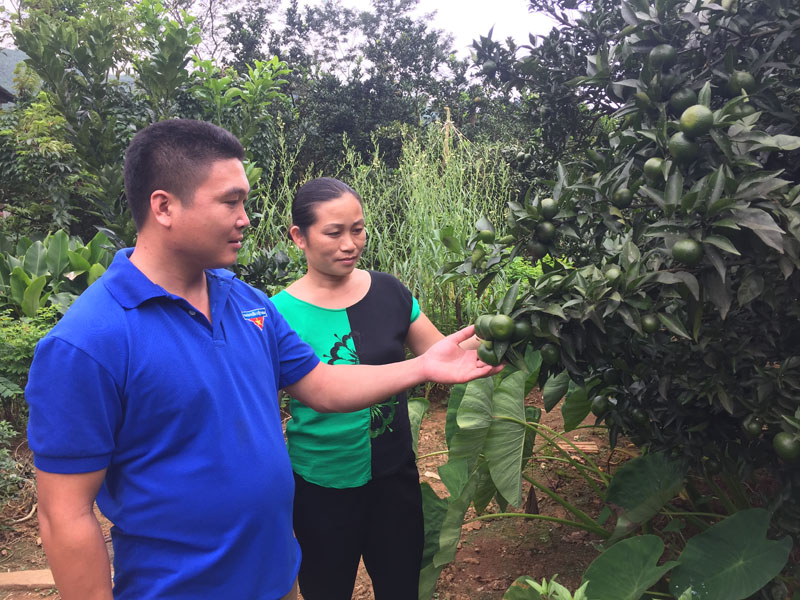
(HBO) – Implementing the national target programme on building new-style rural area, Cao Son commune in Da Bac district, northern mountainous Hoa Binh province, has to date achieved 11 out of 19 criteria. The commune has found it hard to fulfill criteria on income of local people and rate of poor households.
Cao Son commune’s per capita
income now stands at 22.6 million VND per year, while its rate of poor
households is 36 percent, and its proportion of near-poor families is 25.51
percent. Therefore, local authorities are working to raise income of people and
promote the commune’s socio-economic development.

Cadres of Cao Son commune (Da Bac district) share experiences in
growing citrus fruits with the family of Dinh Thi Guong in Na Chieu hamlet.
According to statistics, the
commune has expanded plantation area for key crops such as maize by 550 ha and
of cannaceae by 350 ha. Citrus fruits are cultivated on 130 ha, of which more
than 40 ha are used for commercial purpose. The locality maintains its herd of
cattle and poultry at over 17,000 heads. Industrial and craft production has
received significant attention from the local authorities. The entire commune
has 100 production and business establishments, focusing on processing cannaceae,
and producing construction materials and wooden products.
We visited the family of Dinh Thi
Guong in Na Chieu hamlet, a pioneer in growing citrus fruits in the commune. To
date, her citrus fruit garden has been expanded to more than 6,000 sq. m with
400 orange trees. In 2017, her family sold 10 million tonnes of fruits and earned
nearly 300 million VND. Merchants to her garden were mainly from Hanoi and nearby areas.
To help needy households get
access to preferential loans, Cao Son commune has got the mandate from the Vietnam
Bank for Social Policies and the Vietnam Bank for Agriculture and Rural
Development, with total outstanding loans reaching 57 billion VND. Every year,
the local social education centre works with relevant organisations and sectors
to hold 3 – 4 training sessions on farming for local farmers.
Dao Village’s honey – a product certified with a 3-star OCOP (One Commune One Product) rating by Thong Nhat Agricultural Cooperative in Dao Village (Hoa Binh City) – is highly regarded by consumers for its quality, richness, and variety in packaging. The distinctively sweet taste of Dao Village’s honey leaves a lasting impression on anyone who has tried it.
In alignment with Project No. 07-DA/TU, issued by the Hoa Binh provincial Party Committee on November 1, 2021, Lac Thuy district has actively promoted investment and supported the sustainable development of its industrial and handicraft sectors during the 2021–2025 period. Alongside this, the district has remained committed to preserving and revitalising traditional craft villages.
Located in the northern part of Lac Thuy district, with a temperate climate and fertile soil, Phu Thanh commune has great potential and advantages in growing tea. The long-standing experience, combined with strict adherence to organic farming practices in the tea gardens, ensures that the dried tea products from Phu Thanh and Lac Thuy as a whole are sold out immediately upon production, providing a stable and prosperous life for the local people.
Amid efforts to streamline the administrative apparatus, Hoa Binh province has intensified measures to address challenges in land clearance, resettlement support, and infrastructure investment, aiming to speed up the progress of key projects.
Hoa Binh province has posted an unprecedented economic growth rate of 12.76% in the first quarter of 2025, marking its highest quarterly performance to date and positioning it as the second fastest-growing locality in the country, trailing only Bac Giang province.
Under current regulations, products in the One Commune – One Product (OCOP) programme that are rated three stars or higher must undergo re-evaluation every three months. However, in reality, some of these products fail to consistently meet the required standards, raising concerns about the sustainability of their OCOP certification. This underscores the urgent need for producers to enhance product quality and gradually develop their OCOP products into strong, marketable brands.



